BMP4002 Business Law: UK Law-Making Process and Impact on Businesses
VerifiedAdded on 2023/06/09
|5
|1996
|291
Report
AI Summary
This report provides an overview of the UK legal system, including classifications of laws such as common law, civil law, and religious law, and sources of law like statutes, delegated legislation, and EU law. It examines the impact of the UK law-making process on commercial organizations, particularly focusing on contract law and its importance for businesses. The report also discusses the influence of these laws on multilingualism within British organizations. This comprehensive analysis offers insights into how the UK legal framework shapes business operations and contractual agreements.
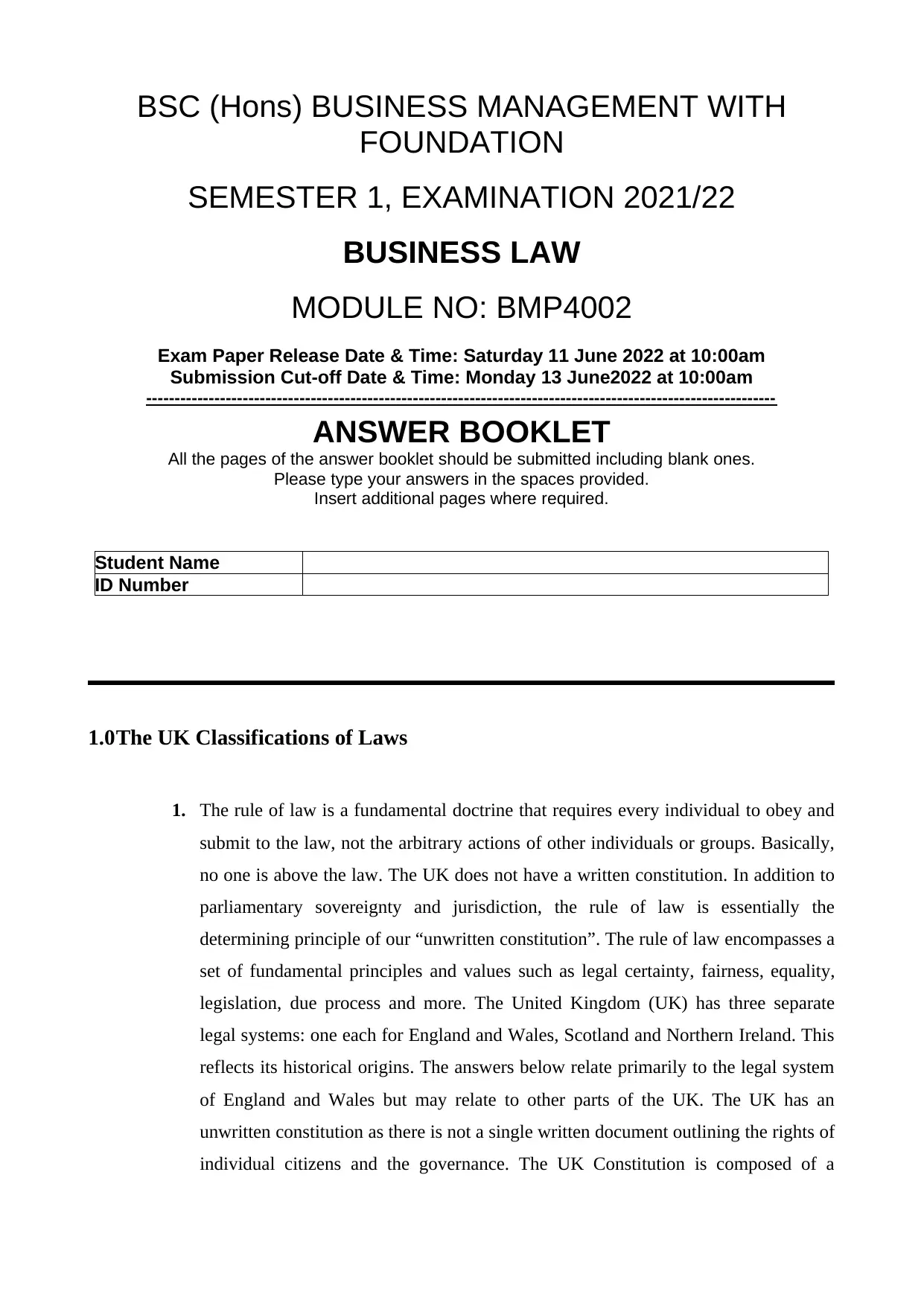
BSC (Hons) BUSINESS MANAGEMENT WITH
FOUNDATION
SEMESTER 1, EXAMINATION 2021/22
BUSINESS LAW
MODULE NO: BMP4002
Exam Paper Release Date & Time: Saturday 11 June 2022 at 10:00am
Submission Cut-off Date & Time: Monday 13 June2022 at 10:00am
---------------------------------------------------------------------------------------------------------------
ANSWER BOOKLET
All the pages of the answer booklet should be submitted including blank ones.
Please type your answers in the spaces provided.
Insert additional pages where required.
Student Name
ID Number
1.0The UK Classifications of Laws
1. The rule of law is a fundamental doctrine that requires every individual to obey and
submit to the law, not the arbitrary actions of other individuals or groups. Basically,
no one is above the law. The UK does not have a written constitution. In addition to
parliamentary sovereignty and jurisdiction, the rule of law is essentially the
determining principle of our “unwritten constitution”. The rule of law encompasses a
set of fundamental principles and values such as legal certainty, fairness, equality,
legislation, due process and more. The United Kingdom (UK) has three separate
legal systems: one each for England and Wales, Scotland and Northern Ireland. This
reflects its historical origins. The answers below relate primarily to the legal system
of England and Wales but may relate to other parts of the UK. The UK has an
unwritten constitution as there is not a single written document outlining the rights of
individual citizens and the governance. The UK Constitution is composed of a
FOUNDATION
SEMESTER 1, EXAMINATION 2021/22
BUSINESS LAW
MODULE NO: BMP4002
Exam Paper Release Date & Time: Saturday 11 June 2022 at 10:00am
Submission Cut-off Date & Time: Monday 13 June2022 at 10:00am
---------------------------------------------------------------------------------------------------------------
ANSWER BOOKLET
All the pages of the answer booklet should be submitted including blank ones.
Please type your answers in the spaces provided.
Insert additional pages where required.
Student Name
ID Number
1.0The UK Classifications of Laws
1. The rule of law is a fundamental doctrine that requires every individual to obey and
submit to the law, not the arbitrary actions of other individuals or groups. Basically,
no one is above the law. The UK does not have a written constitution. In addition to
parliamentary sovereignty and jurisdiction, the rule of law is essentially the
determining principle of our “unwritten constitution”. The rule of law encompasses a
set of fundamental principles and values such as legal certainty, fairness, equality,
legislation, due process and more. The United Kingdom (UK) has three separate
legal systems: one each for England and Wales, Scotland and Northern Ireland. This
reflects its historical origins. The answers below relate primarily to the legal system
of England and Wales but may relate to other parts of the UK. The UK has an
unwritten constitution as there is not a single written document outlining the rights of
individual citizens and the governance. The UK Constitution is composed of a
Paraphrase This Document
Need a fresh take? Get an instant paraphrase of this document with our AI Paraphraser
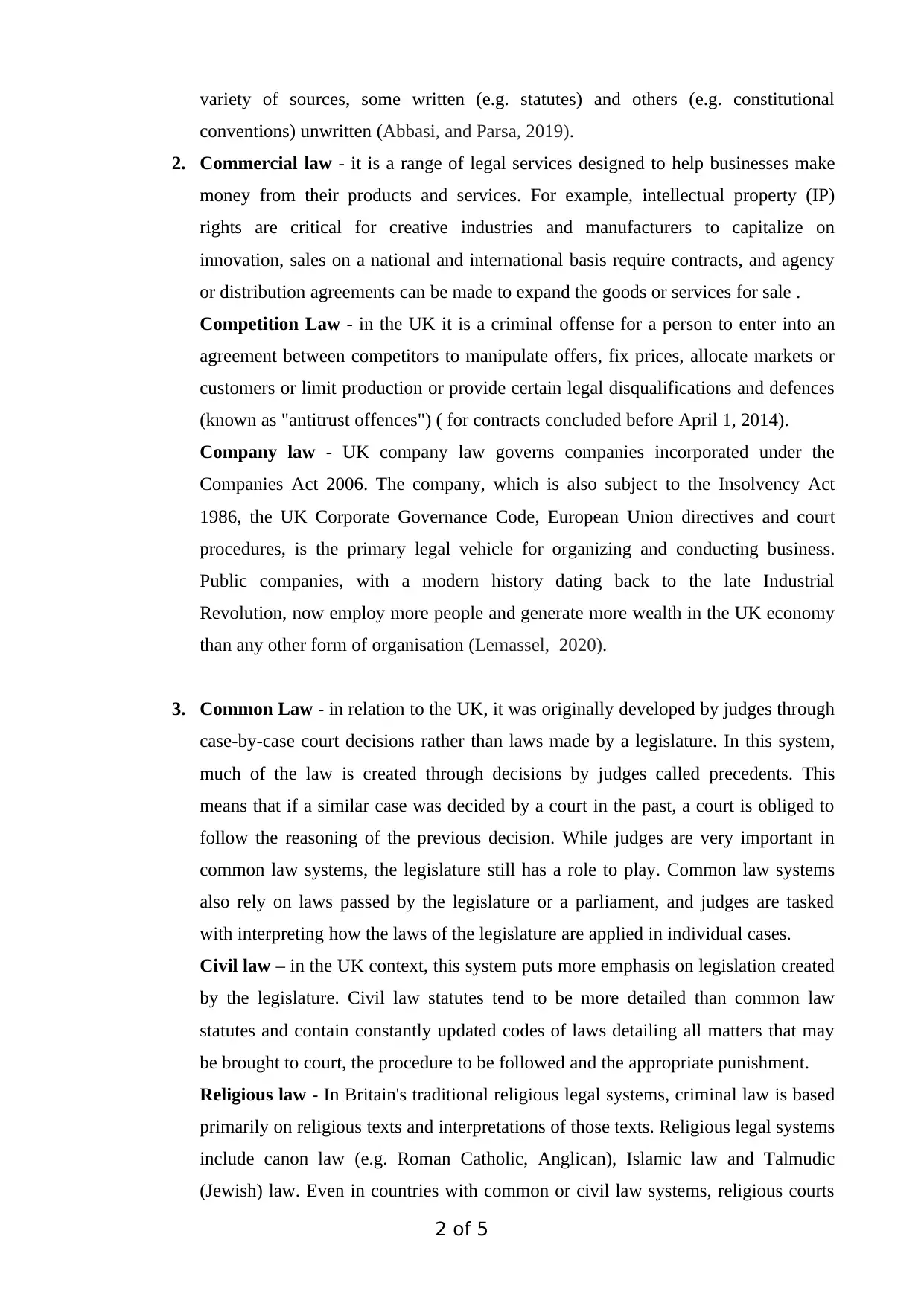
variety of sources, some written (e.g. statutes) and others (e.g. constitutional
conventions) unwritten (Abbasi, and Parsa, 2019).
2. Commercial law - it is a range of legal services designed to help businesses make
money from their products and services. For example, intellectual property (IP)
rights are critical for creative industries and manufacturers to capitalize on
innovation, sales on a national and international basis require contracts, and agency
or distribution agreements can be made to expand the goods or services for sale .
Competition Law - in the UK it is a criminal offense for a person to enter into an
agreement between competitors to manipulate offers, fix prices, allocate markets or
customers or limit production or provide certain legal disqualifications and defences
(known as "antitrust offences") ( for contracts concluded before April 1, 2014).
Company law - UK company law governs companies incorporated under the
Companies Act 2006. The company, which is also subject to the Insolvency Act
1986, the UK Corporate Governance Code, European Union directives and court
procedures, is the primary legal vehicle for organizing and conducting business.
Public companies, with a modern history dating back to the late Industrial
Revolution, now employ more people and generate more wealth in the UK economy
than any other form of organisation (Lemassel, 2020).
3. Common Law - in relation to the UK, it was originally developed by judges through
case-by-case court decisions rather than laws made by a legislature. In this system,
much of the law is created through decisions by judges called precedents. This
means that if a similar case was decided by a court in the past, a court is obliged to
follow the reasoning of the previous decision. While judges are very important in
common law systems, the legislature still has a role to play. Common law systems
also rely on laws passed by the legislature or a parliament, and judges are tasked
with interpreting how the laws of the legislature are applied in individual cases.
Civil law – in the UK context, this system puts more emphasis on legislation created
by the legislature. Civil law statutes tend to be more detailed than common law
statutes and contain constantly updated codes of laws detailing all matters that may
be brought to court, the procedure to be followed and the appropriate punishment.
Religious law - In Britain's traditional religious legal systems, criminal law is based
primarily on religious texts and interpretations of those texts. Religious legal systems
include canon law (e.g. Roman Catholic, Anglican), Islamic law and Talmudic
(Jewish) law. Even in countries with common or civil law systems, religious courts
2 of 5
conventions) unwritten (Abbasi, and Parsa, 2019).
2. Commercial law - it is a range of legal services designed to help businesses make
money from their products and services. For example, intellectual property (IP)
rights are critical for creative industries and manufacturers to capitalize on
innovation, sales on a national and international basis require contracts, and agency
or distribution agreements can be made to expand the goods or services for sale .
Competition Law - in the UK it is a criminal offense for a person to enter into an
agreement between competitors to manipulate offers, fix prices, allocate markets or
customers or limit production or provide certain legal disqualifications and defences
(known as "antitrust offences") ( for contracts concluded before April 1, 2014).
Company law - UK company law governs companies incorporated under the
Companies Act 2006. The company, which is also subject to the Insolvency Act
1986, the UK Corporate Governance Code, European Union directives and court
procedures, is the primary legal vehicle for organizing and conducting business.
Public companies, with a modern history dating back to the late Industrial
Revolution, now employ more people and generate more wealth in the UK economy
than any other form of organisation (Lemassel, 2020).
3. Common Law - in relation to the UK, it was originally developed by judges through
case-by-case court decisions rather than laws made by a legislature. In this system,
much of the law is created through decisions by judges called precedents. This
means that if a similar case was decided by a court in the past, a court is obliged to
follow the reasoning of the previous decision. While judges are very important in
common law systems, the legislature still has a role to play. Common law systems
also rely on laws passed by the legislature or a parliament, and judges are tasked
with interpreting how the laws of the legislature are applied in individual cases.
Civil law – in the UK context, this system puts more emphasis on legislation created
by the legislature. Civil law statutes tend to be more detailed than common law
statutes and contain constantly updated codes of laws detailing all matters that may
be brought to court, the procedure to be followed and the appropriate punishment.
Religious law - In Britain's traditional religious legal systems, criminal law is based
primarily on religious texts and interpretations of those texts. Religious legal systems
include canon law (e.g. Roman Catholic, Anglican), Islamic law and Talmudic
(Jewish) law. Even in countries with common or civil law systems, religious courts
2 of 5
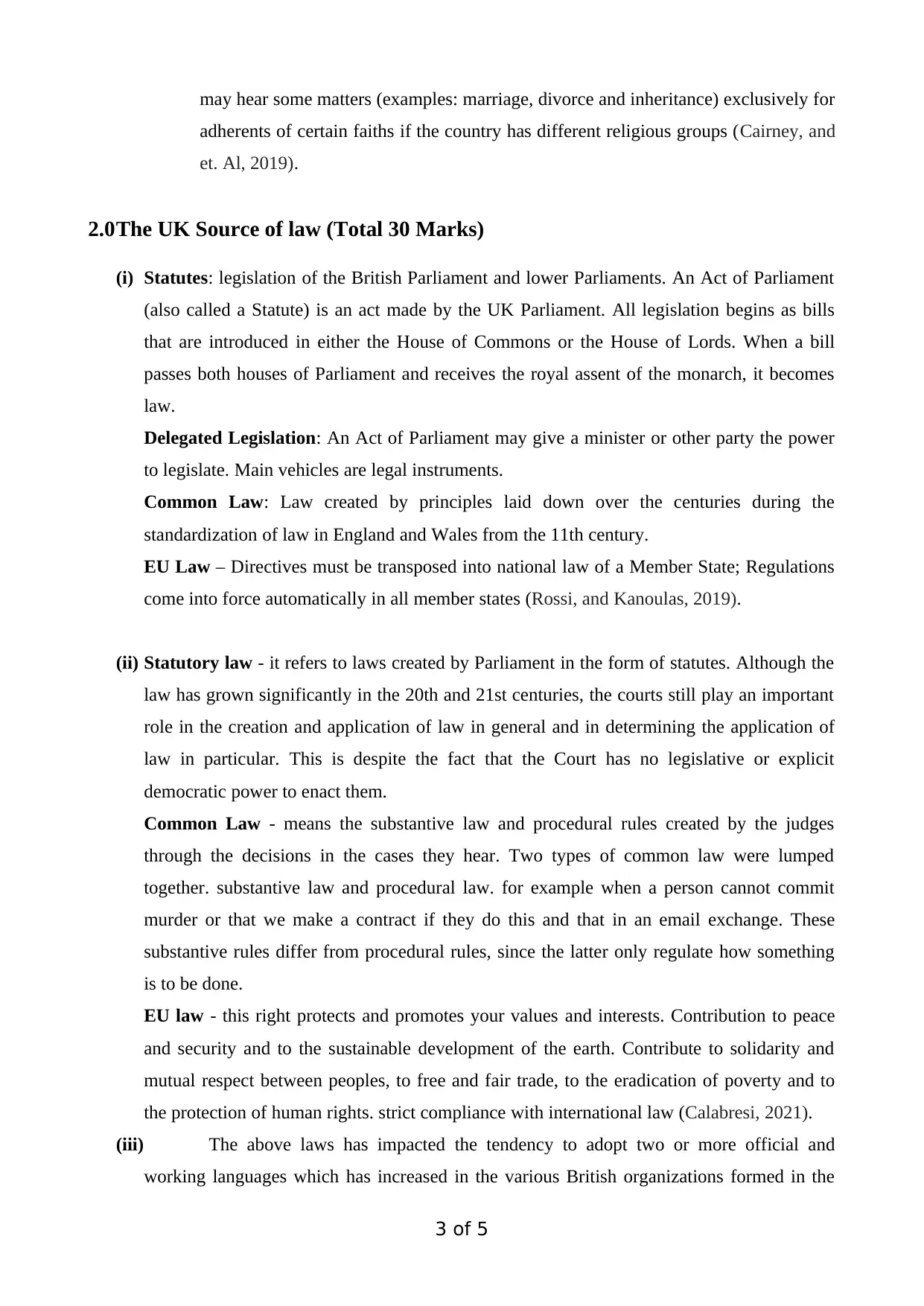
may hear some matters (examples: marriage, divorce and inheritance) exclusively for
adherents of certain faiths if the country has different religious groups (Cairney, and
et. Al, 2019).
2.0The UK Source of law (Total 30 Marks)
(i) Statutes: legislation of the British Parliament and lower Parliaments. An Act of Parliament
(also called a Statute) is an act made by the UK Parliament. All legislation begins as bills
that are introduced in either the House of Commons or the House of Lords. When a bill
passes both houses of Parliament and receives the royal assent of the monarch, it becomes
law.
Delegated Legislation: An Act of Parliament may give a minister or other party the power
to legislate. Main vehicles are legal instruments.
Common Law: Law created by principles laid down over the centuries during the
standardization of law in England and Wales from the 11th century.
EU Law – Directives must be transposed into national law of a Member State; Regulations
come into force automatically in all member states (Rossi, and Kanoulas, 2019).
(ii) Statutory law - it refers to laws created by Parliament in the form of statutes. Although the
law has grown significantly in the 20th and 21st centuries, the courts still play an important
role in the creation and application of law in general and in determining the application of
law in particular. This is despite the fact that the Court has no legislative or explicit
democratic power to enact them.
Common Law - means the substantive law and procedural rules created by the judges
through the decisions in the cases they hear. Two types of common law were lumped
together. substantive law and procedural law. for example when a person cannot commit
murder or that we make a contract if they do this and that in an email exchange. These
substantive rules differ from procedural rules, since the latter only regulate how something
is to be done.
EU law - this right protects and promotes your values and interests. Contribution to peace
and security and to the sustainable development of the earth. Contribute to solidarity and
mutual respect between peoples, to free and fair trade, to the eradication of poverty and to
the protection of human rights. strict compliance with international law (Calabresi, 2021).
(iii) The above laws has impacted the tendency to adopt two or more official and
working languages which has increased in the various British organizations formed in the
3 of 5
adherents of certain faiths if the country has different religious groups (Cairney, and
et. Al, 2019).
2.0The UK Source of law (Total 30 Marks)
(i) Statutes: legislation of the British Parliament and lower Parliaments. An Act of Parliament
(also called a Statute) is an act made by the UK Parliament. All legislation begins as bills
that are introduced in either the House of Commons or the House of Lords. When a bill
passes both houses of Parliament and receives the royal assent of the monarch, it becomes
law.
Delegated Legislation: An Act of Parliament may give a minister or other party the power
to legislate. Main vehicles are legal instruments.
Common Law: Law created by principles laid down over the centuries during the
standardization of law in England and Wales from the 11th century.
EU Law – Directives must be transposed into national law of a Member State; Regulations
come into force automatically in all member states (Rossi, and Kanoulas, 2019).
(ii) Statutory law - it refers to laws created by Parliament in the form of statutes. Although the
law has grown significantly in the 20th and 21st centuries, the courts still play an important
role in the creation and application of law in general and in determining the application of
law in particular. This is despite the fact that the Court has no legislative or explicit
democratic power to enact them.
Common Law - means the substantive law and procedural rules created by the judges
through the decisions in the cases they hear. Two types of common law were lumped
together. substantive law and procedural law. for example when a person cannot commit
murder or that we make a contract if they do this and that in an email exchange. These
substantive rules differ from procedural rules, since the latter only regulate how something
is to be done.
EU law - this right protects and promotes your values and interests. Contribution to peace
and security and to the sustainable development of the earth. Contribute to solidarity and
mutual respect between peoples, to free and fair trade, to the eradication of poverty and to
the protection of human rights. strict compliance with international law (Calabresi, 2021).
(iii) The above laws has impacted the tendency to adopt two or more official and
working languages which has increased in the various British organizations formed in the
3 of 5
⊘ This is a preview!⊘
Do you want full access?
Subscribe today to unlock all pages.

Trusted by 1+ million students worldwide
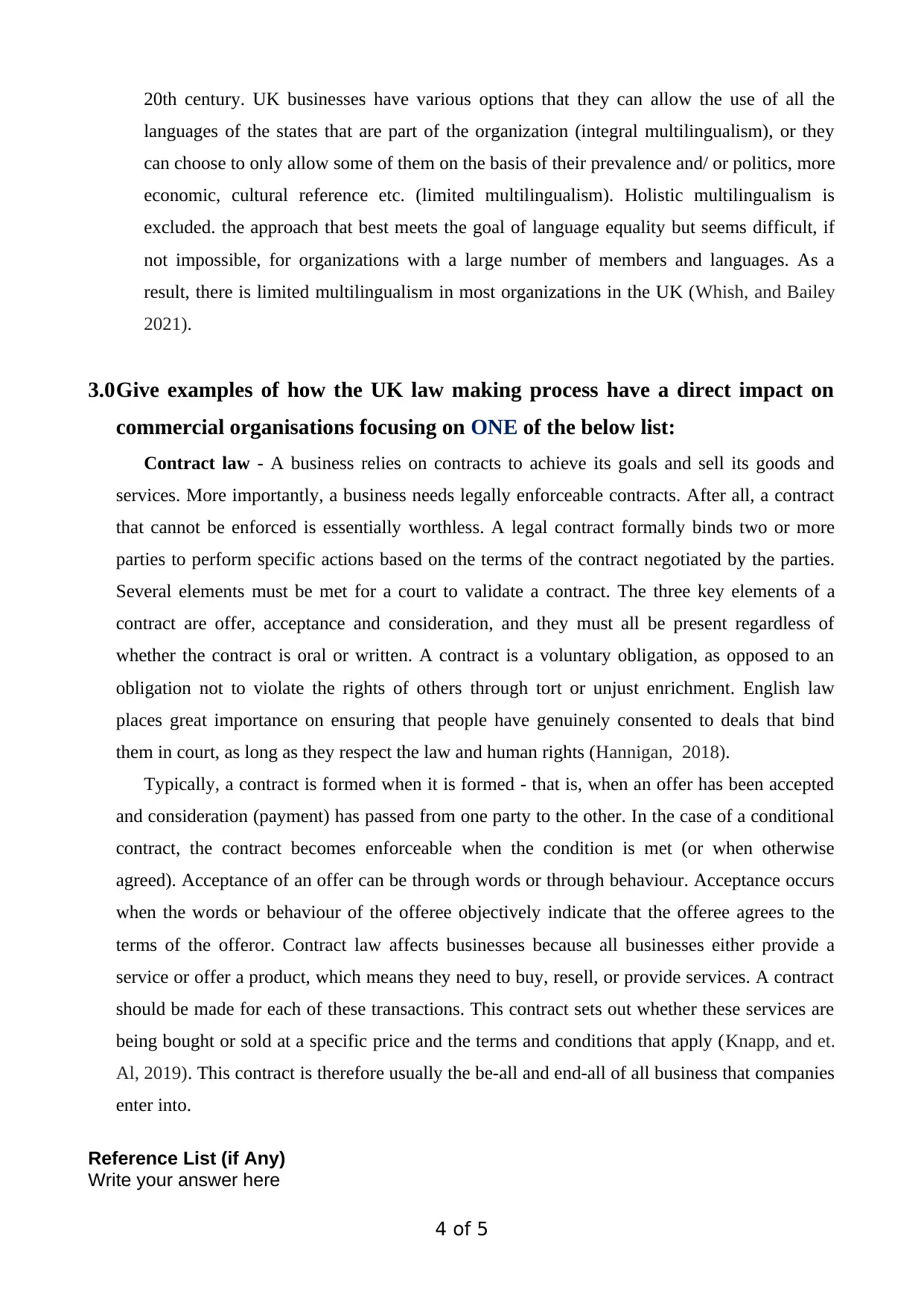
20th century. UK businesses have various options that they can allow the use of all the
languages of the states that are part of the organization (integral multilingualism), or they
can choose to only allow some of them on the basis of their prevalence and/ or politics, more
economic, cultural reference etc. (limited multilingualism). Holistic multilingualism is
excluded. the approach that best meets the goal of language equality but seems difficult, if
not impossible, for organizations with a large number of members and languages. As a
result, there is limited multilingualism in most organizations in the UK (Whish, and Bailey
2021).
3.0Give examples of how the UK law making process have a direct impact on
commercial organisations focusing on ONE of the below list:
Contract law - A business relies on contracts to achieve its goals and sell its goods and
services. More importantly, a business needs legally enforceable contracts. After all, a contract
that cannot be enforced is essentially worthless. A legal contract formally binds two or more
parties to perform specific actions based on the terms of the contract negotiated by the parties.
Several elements must be met for a court to validate a contract. The three key elements of a
contract are offer, acceptance and consideration, and they must all be present regardless of
whether the contract is oral or written. A contract is a voluntary obligation, as opposed to an
obligation not to violate the rights of others through tort or unjust enrichment. English law
places great importance on ensuring that people have genuinely consented to deals that bind
them in court, as long as they respect the law and human rights (Hannigan, 2018).
Typically, a contract is formed when it is formed - that is, when an offer has been accepted
and consideration (payment) has passed from one party to the other. In the case of a conditional
contract, the contract becomes enforceable when the condition is met (or when otherwise
agreed). Acceptance of an offer can be through words or through behaviour. Acceptance occurs
when the words or behaviour of the offeree objectively indicate that the offeree agrees to the
terms of the offeror. Contract law affects businesses because all businesses either provide a
service or offer a product, which means they need to buy, resell, or provide services. A contract
should be made for each of these transactions. This contract sets out whether these services are
being bought or sold at a specific price and the terms and conditions that apply (Knapp, and et.
Al, 2019). This contract is therefore usually the be-all and end-all of all business that companies
enter into.
Reference List (if Any)
Write your answer here
4 of 5
languages of the states that are part of the organization (integral multilingualism), or they
can choose to only allow some of them on the basis of their prevalence and/ or politics, more
economic, cultural reference etc. (limited multilingualism). Holistic multilingualism is
excluded. the approach that best meets the goal of language equality but seems difficult, if
not impossible, for organizations with a large number of members and languages. As a
result, there is limited multilingualism in most organizations in the UK (Whish, and Bailey
2021).
3.0Give examples of how the UK law making process have a direct impact on
commercial organisations focusing on ONE of the below list:
Contract law - A business relies on contracts to achieve its goals and sell its goods and
services. More importantly, a business needs legally enforceable contracts. After all, a contract
that cannot be enforced is essentially worthless. A legal contract formally binds two or more
parties to perform specific actions based on the terms of the contract negotiated by the parties.
Several elements must be met for a court to validate a contract. The three key elements of a
contract are offer, acceptance and consideration, and they must all be present regardless of
whether the contract is oral or written. A contract is a voluntary obligation, as opposed to an
obligation not to violate the rights of others through tort or unjust enrichment. English law
places great importance on ensuring that people have genuinely consented to deals that bind
them in court, as long as they respect the law and human rights (Hannigan, 2018).
Typically, a contract is formed when it is formed - that is, when an offer has been accepted
and consideration (payment) has passed from one party to the other. In the case of a conditional
contract, the contract becomes enforceable when the condition is met (or when otherwise
agreed). Acceptance of an offer can be through words or through behaviour. Acceptance occurs
when the words or behaviour of the offeree objectively indicate that the offeree agrees to the
terms of the offeror. Contract law affects businesses because all businesses either provide a
service or offer a product, which means they need to buy, resell, or provide services. A contract
should be made for each of these transactions. This contract sets out whether these services are
being bought or sold at a specific price and the terms and conditions that apply (Knapp, and et.
Al, 2019). This contract is therefore usually the be-all and end-all of all business that companies
enter into.
Reference List (if Any)
Write your answer here
4 of 5
Paraphrase This Document
Need a fresh take? Get an instant paraphrase of this document with our AI Paraphraser
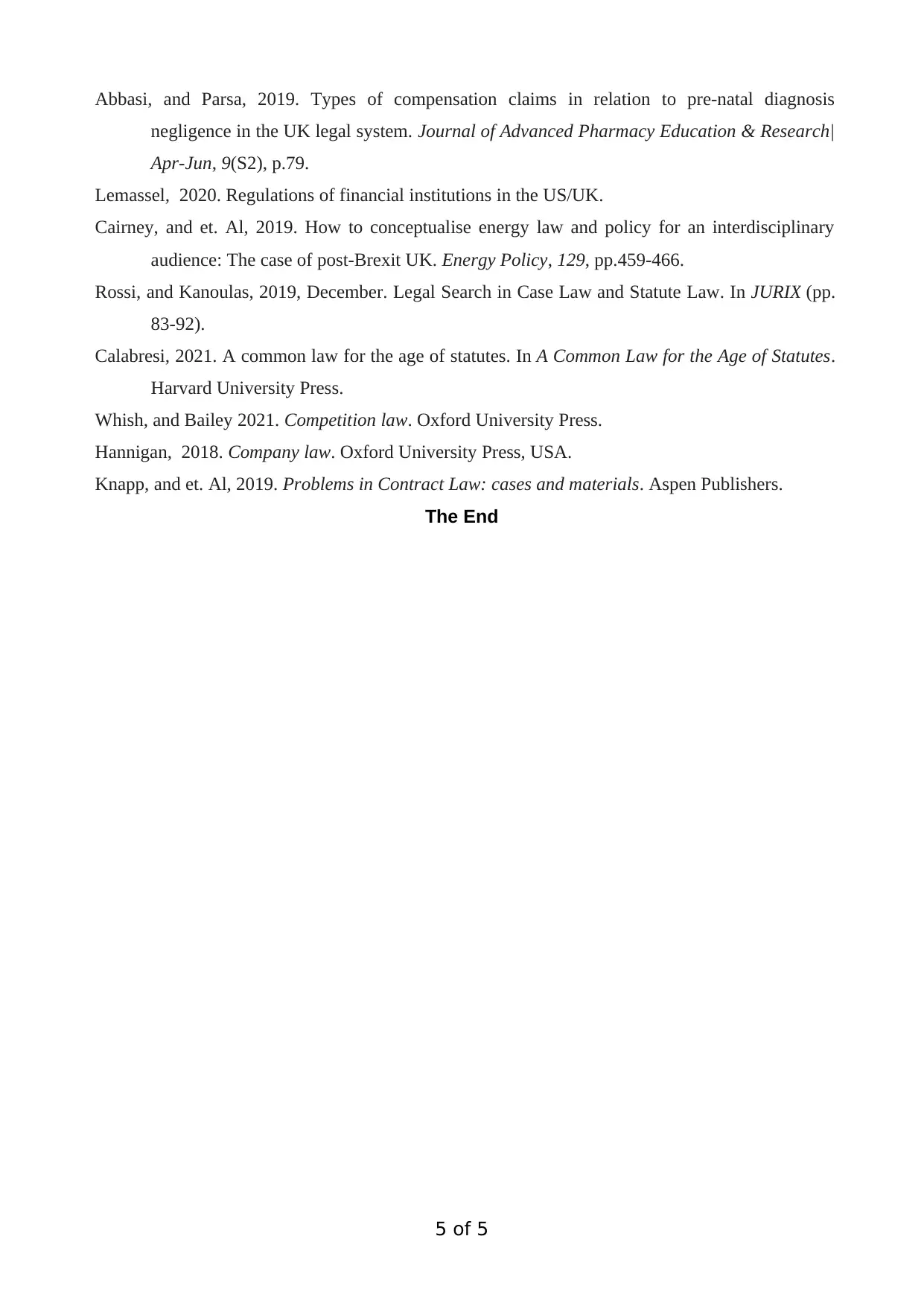
Abbasi, and Parsa, 2019. Types of compensation claims in relation to pre-natal diagnosis
negligence in the UK legal system. Journal of Advanced Pharmacy Education & Research|
Apr-Jun, 9(S2), p.79.
Lemassel, 2020. Regulations of financial institutions in the US/UK.
Cairney, and et. Al, 2019. How to conceptualise energy law and policy for an interdisciplinary
audience: The case of post-Brexit UK. Energy Policy, 129, pp.459-466.
Rossi, and Kanoulas, 2019, December. Legal Search in Case Law and Statute Law. In JURIX (pp.
83-92).
Calabresi, 2021. A common law for the age of statutes. In A Common Law for the Age of Statutes.
Harvard University Press.
Whish, and Bailey 2021. Competition law. Oxford University Press.
Hannigan, 2018. Company law. Oxford University Press, USA.
Knapp, and et. Al, 2019. Problems in Contract Law: cases and materials. Aspen Publishers.
The End
5 of 5
negligence in the UK legal system. Journal of Advanced Pharmacy Education & Research|
Apr-Jun, 9(S2), p.79.
Lemassel, 2020. Regulations of financial institutions in the US/UK.
Cairney, and et. Al, 2019. How to conceptualise energy law and policy for an interdisciplinary
audience: The case of post-Brexit UK. Energy Policy, 129, pp.459-466.
Rossi, and Kanoulas, 2019, December. Legal Search in Case Law and Statute Law. In JURIX (pp.
83-92).
Calabresi, 2021. A common law for the age of statutes. In A Common Law for the Age of Statutes.
Harvard University Press.
Whish, and Bailey 2021. Competition law. Oxford University Press.
Hannigan, 2018. Company law. Oxford University Press, USA.
Knapp, and et. Al, 2019. Problems in Contract Law: cases and materials. Aspen Publishers.
The End
5 of 5
1 out of 5
Related Documents
Your All-in-One AI-Powered Toolkit for Academic Success.
+13062052269
info@desklib.com
Available 24*7 on WhatsApp / Email
![[object Object]](/_next/static/media/star-bottom.7253800d.svg)
Unlock your academic potential
Copyright © 2020–2026 A2Z Services. All Rights Reserved. Developed and managed by ZUCOL.


